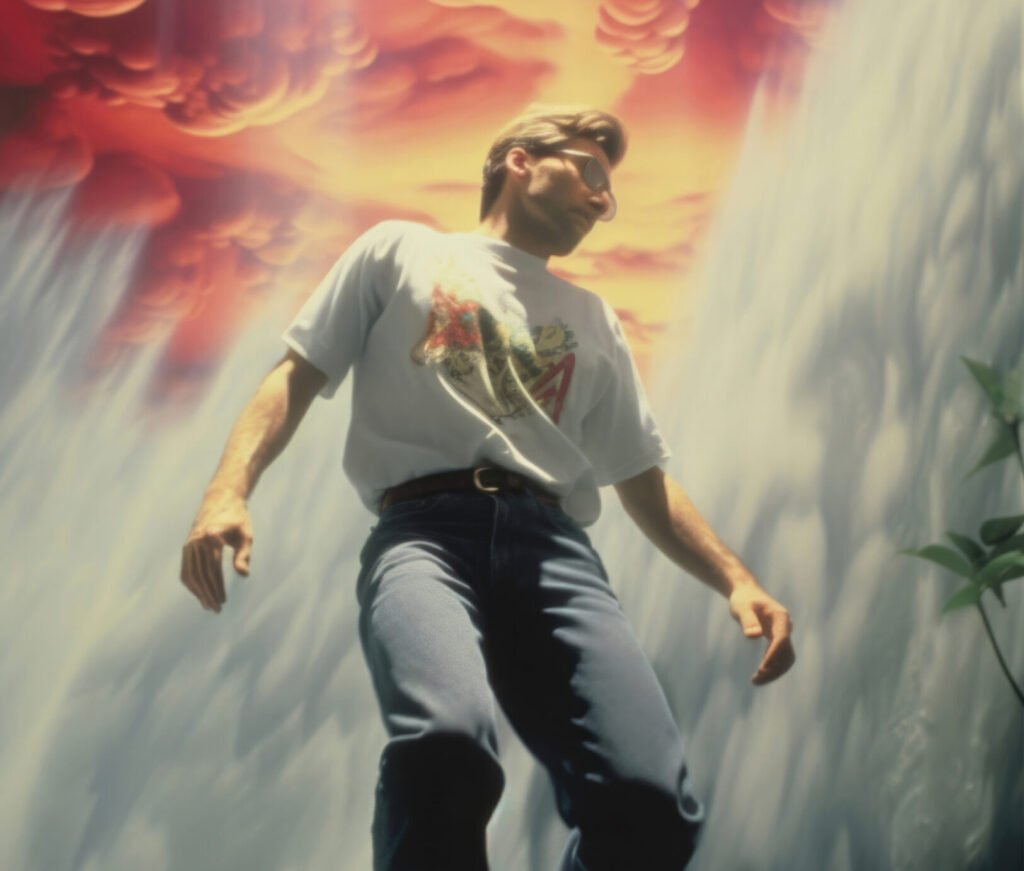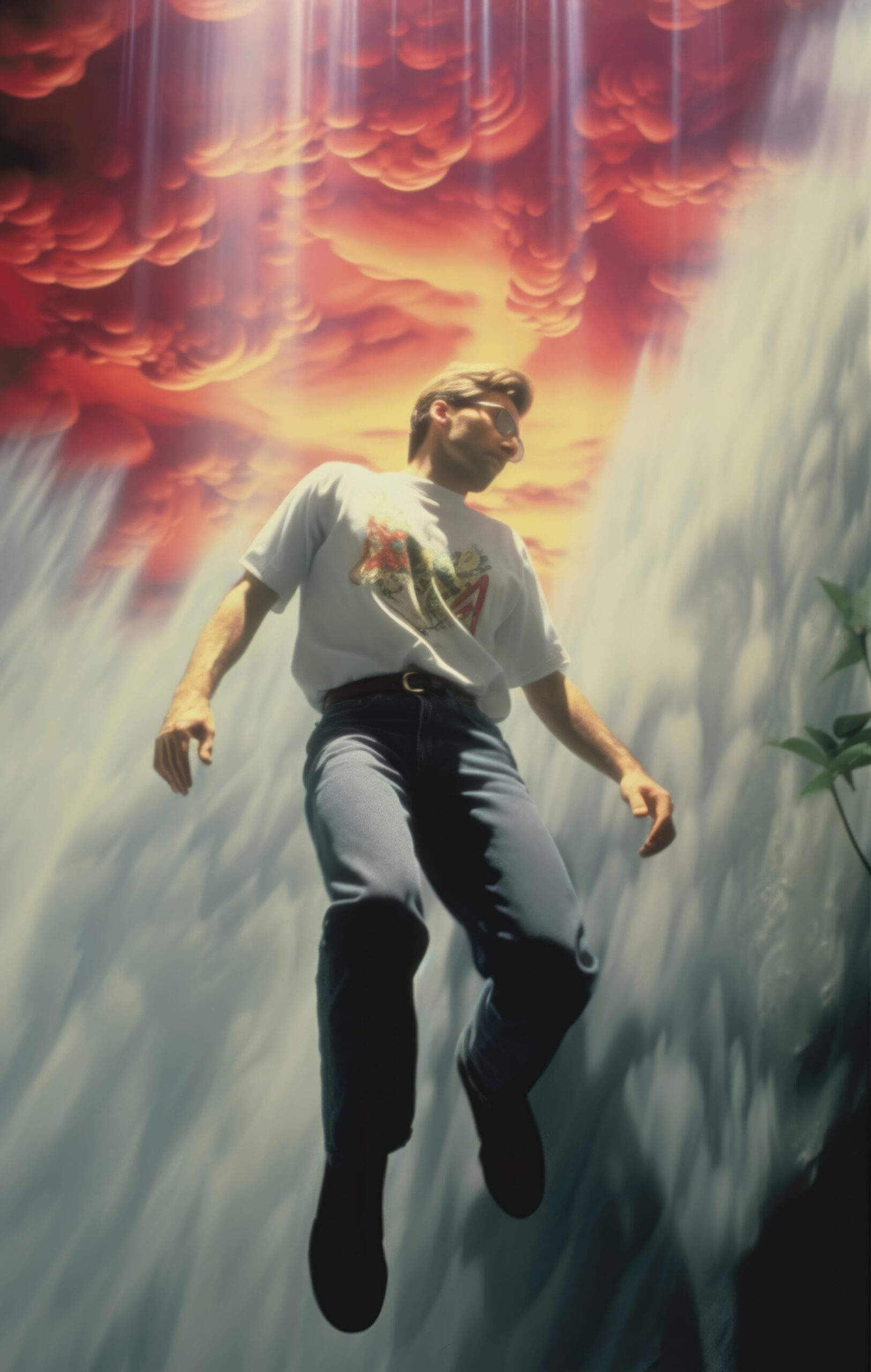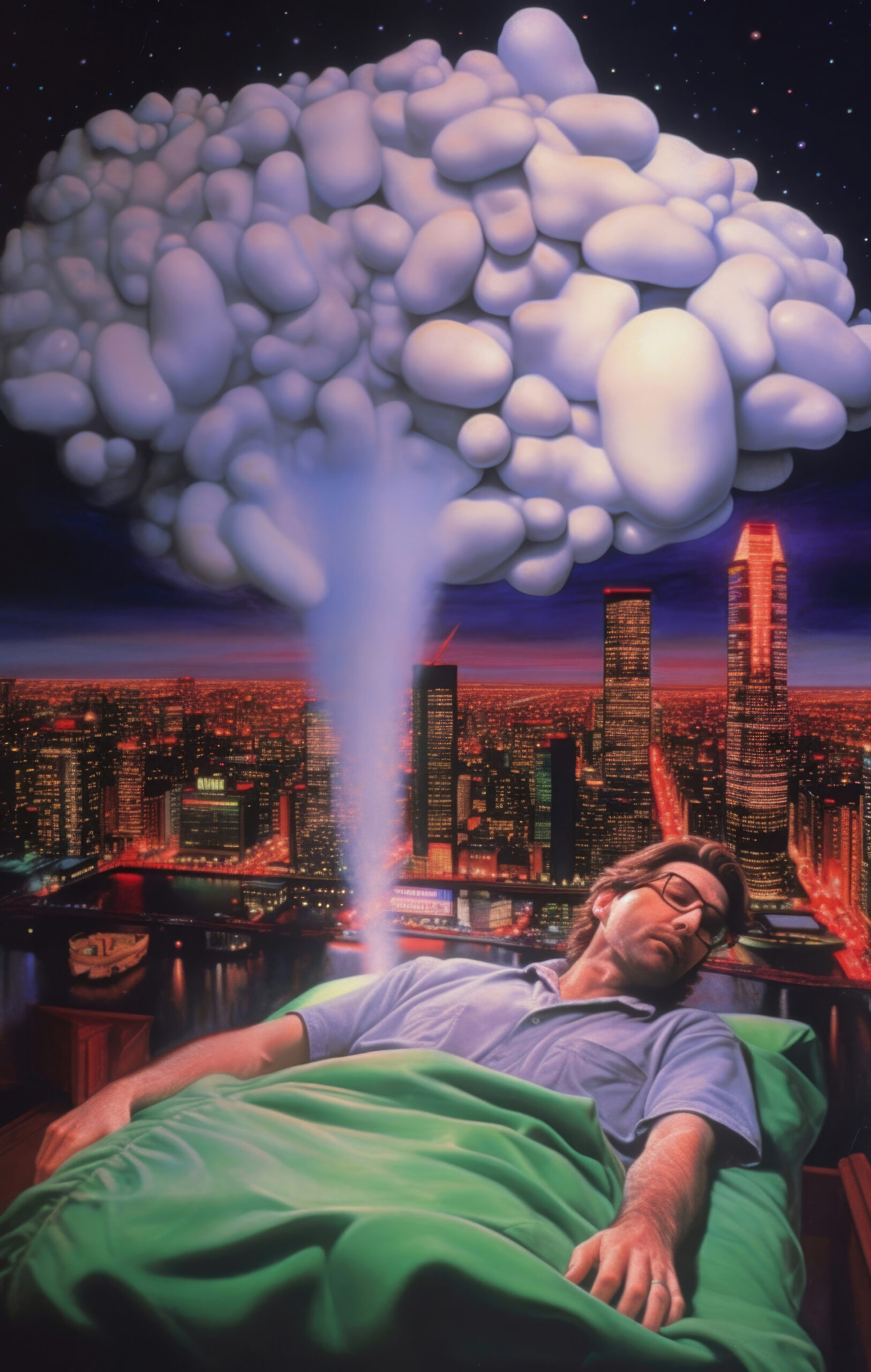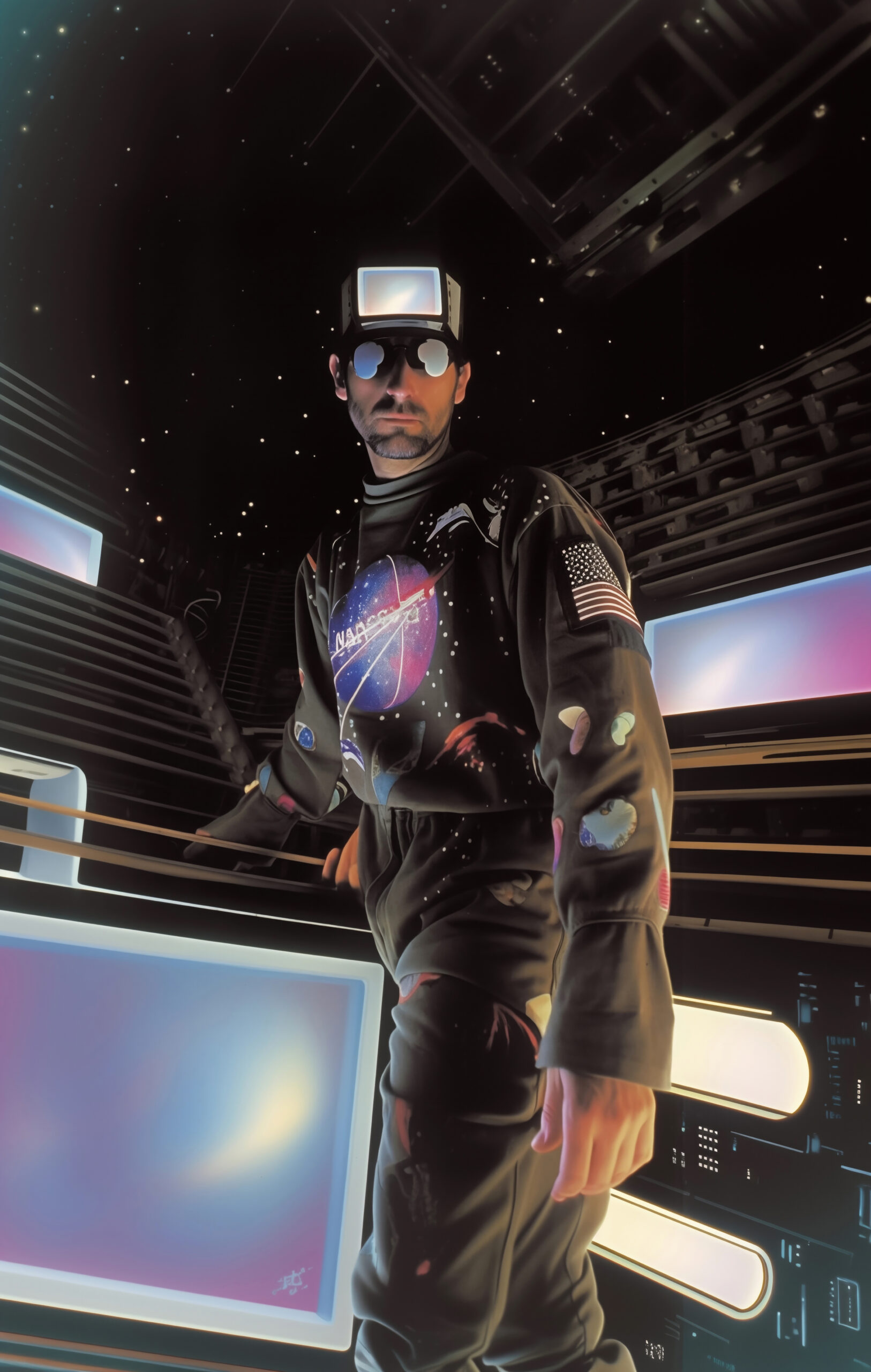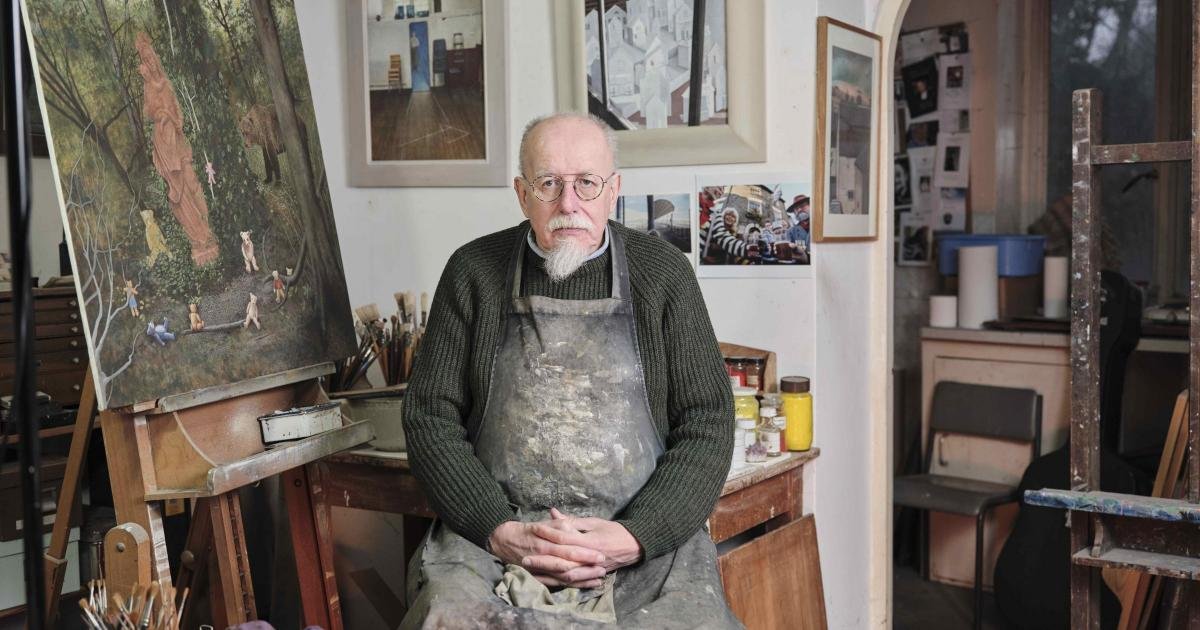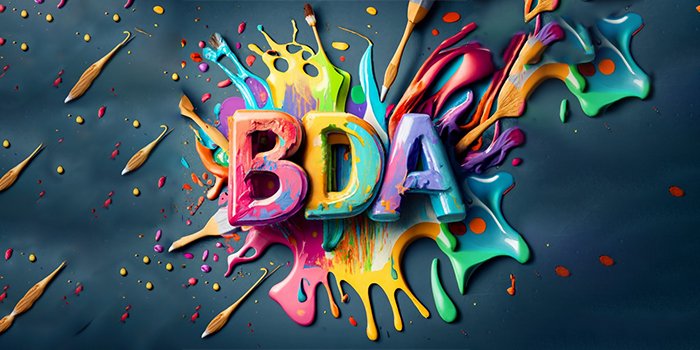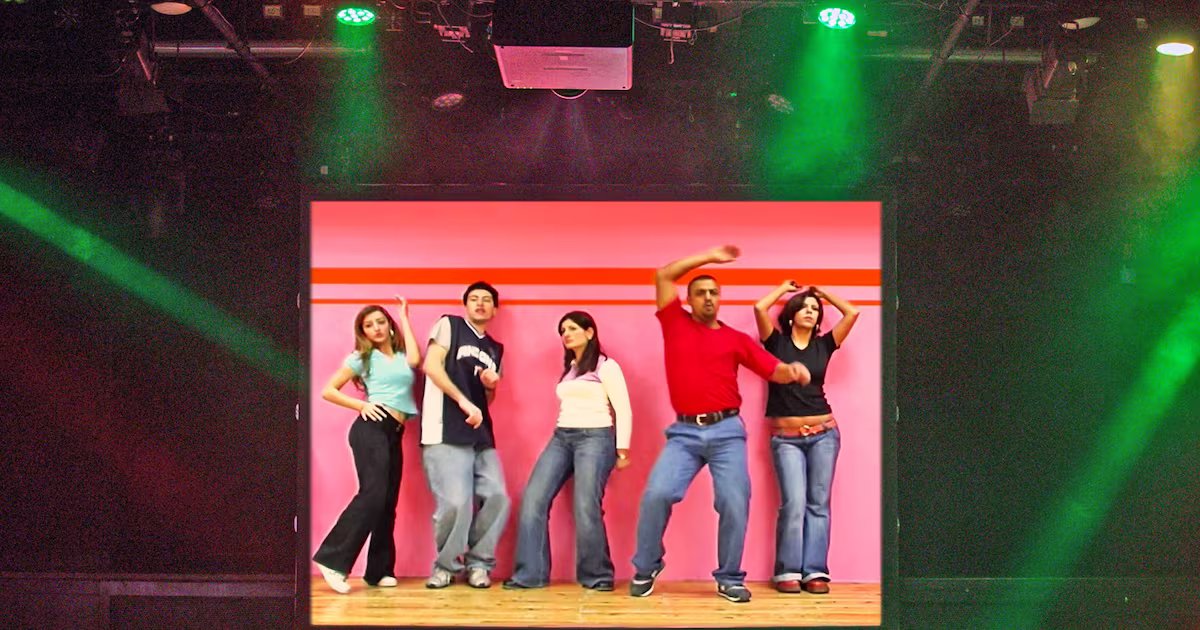Since his beginnings as an explorer in the virtual world Second Life, Jon Rafman has been known for creating work best described as a glimpse into one’s psyche after some particularly intense doomscrolling. From his seminal series Nine Eyes, a beautiful and disturbing exploration of the earth as seen through Google Street View, to his mind-bending animated film Dream Journal 2016–2019, Rafman’s art explores the technological sublime, both critiquing and celebrating our increasingly digital lives. More recently, he has embraced artificial intelligence, and this fall, the Montreal-born artist will present new work (including eerie A.I.-generated images like the ones in this story), at exhibitions in New York, Rome, Taipei, Hong Kong, and Copenhagen. As he prepares for an IRL world tour, Rafman called up his friend, the actor and podcaster Dasha Nekrasova, to discuss tech anxiety, AOL chat rooms, and art as a tool for enlightenment.
———
DASHA NEKRASOVA: Hey Jon.
JON RAFMAN: Hey Dasha, how are you?
NEKRASOVA: I’m good. I want to start off by asking you about the painting you gave me.
RAFMAN: [Laughs] Okay, could you describe it for people out there?
NEKRASOVA: It’s a chihuahua having sex with a pig, with three pit bulls looking at them judgmentally as a storm rolls in.
RAFMAN: Exactly. It was inspired by my deep dives into DeviantArt[.com], which is like a microcosm of the old internet I grew up on, an internet that didn’t sanitize anything. I think the last expressions of human weirdness can be found on that site. I’m so happy you like it.
NEKRASOVA: I love it. It’s my favorite piece of art that I own. I truly cherish it.
RAFMAN: You’re making me blush. But I think you and I share this love of taboo subject matters, and we’re both romantics who like the filth and trash of everyday life.
NEKRASOVA: The aesthetic of mess and clutter is something I think we’re both drawn to. I’m working on it, but I believe we’re both very messy people.
RAFMAN: Definitely. But if you had ever met my mother, let’s just say I’m Marie Kondo compared to her.
NEKRASOVA: [Laughs] I remember Polina [Rafman’s wife] talking about how you eat plums in the shower and leave the pits in the soap dish.
RAFMAN: True story.
NEKRASOVA: I feel like it’s both a strength and hindrance to me as an artist to be such a mess, to have the freedom of disorder, but also the dysfunction. I wonder what helps you deal with it?
RAFMAN: To come up with new ideas, you have to have space to be messy, to procrastinate, and to let your mind wander and free-associate. But there needs to be a balance. You eventually need to channel it into something concrete, or you won’t produce anything.
NEKRASOVA: How do you channel it?
RAFMAN: I’m a big fan of Keith Johnstone’s improv techniques. In art school, you’re often taught to aim for originality and intellectual depth. But he says these goals are actually obstacles, that they can lead to creative constipation, analysis paralysis, or contrived work that you think other people will think is smart but isn’t actually true to yourself. It’s essential not to try to seem smart or original, not to try hard.
NEKRASOVA: You have to be in this flow state. I first encountered that idea when I was studying the Strasberg technique. Improvising means making yourself into a kind of vessel and achieving a state wherein you attempt to be a conduit to something extraordinary, hopefully.
RAFMAN: Right.
NEKRASOVA: It’s interesting the way Keith Johnstone is so influenced by his hyper-repressive English schoolboy upbringing.
RAFMAN: That’s true. He says, “Don’t trust the grown-ups.”
NEKRASOVA: The repression that he describes and his ideas about “education” being a hindrance are really prescient.
RAFMAN: In that sense, we’re living as if under the thumb of an authoritarian schoolmaster from a 1940s English boarding school. Fearful of our next caning. We have to forget all we’ve learned.
NEKRASOVA: And the essence of spontaneity is, as Johnstone says, “psychotic, obscene, and unoriginal.” He says that psychotics are actually the least likely to be hypnotized or brainwashed.
RAFMAN: That’s interesting.
NEKRASOVA: Even in Pavlov’s experiments, there were dogs that he had a very hard time brainwashing until he castrated and starved them. In people, the so-called sane are most subject to influence or suggestion because to be “sane” is to conform to a kind of castration.
RAFMAN: Speaking of psychotics, the internet has made so many people go off the deep end. Or it’s also made so many become these disillusioned doomers, irony-poisoned and stuck with a nihilistic outlook. It’s important to acknowledge the realities of the horror show we call life, but also strive to move beyond that and not let the world beat you down or force you into submission.
NEKRASOVA: Right.
RAFMAN: I recently saw this study about safe spaces, and the research revealed they actually do the opposite of what they’re intended to do and fuck the people who are trying to avoid trauma or anxiety even more. Apparently, not getting exposed to different views is worse for people because you avoid developing critical thinking skills or even empathy. They give you a false sense of security, so you’re not really dealing with your fears head-on. When certain topics are off-limits, it ends up stigmatizing and isolating people more, so now you’re just getting triggered left, right, and center.
NEKRASOVA: A lot of these people are not going to make it. They’re psychologically brittle. They avoid things that would actually fortify them. You’ve got to get up there. You have to get humiliated. You have to get totally insulted.
RAFMAN: Repressing stuff only makes it fester and come back in worse forms, a lesson we should have learned over and over from history. I guess this relates to the improv ideas of how important it is to embrace failure, not fear it. It’s so crucial because it’s inevitable. On a side note I was always impressed by how easily you deal with all the hate but also the love you receive online. What’s your secret in dealing with these two extremes?
NEKRASOVA: Oh, I don’t know. At a certain point, you can see it for what it is, which is almost always projection. I’m desensitized to it, and I think it’s made me more robust.
RAFMAN: You don’t tell people what you think they want to hear.
NEKRASOVA: I felt the psychic pressure of it much earlier on when people tried to cancel me for various transgressions, but then things also move so quickly and people forget and I don’t feel it much at all anymore.
RAFMAN: We don’t have time to process one event before moving on to the next these days. How we experience time and memory has been altered completely. It’s like we’re stuck in a perpetual now. When the apocalypse arrives, it’s going to be reduced to just another clickbait headline. Honestly, I’ve been spending a lot less time online this past year and that has been very beneficial.
NEKRASOVA: I’m really jealous.
RAFMAN: You need sustained focus to create anything substantial, and it’s becoming increasingly difficult to achieve.
NEKRASOVA: Because the algorithm is so satisfying.
RAFMAN: The algorithm controls our dopamine reward system. And on top of that, culture moves so fast that you’re expected to be constantly churning out content or else you’ll be forgotten, drowned in the endless data stream. It’s post or perish. But now that I have a baby, my days are filled with joy, so I spend much less time on the internet. And I’m also focusing on producing large-scale works.
NEKRASOVA: I definitely feel that I’m addicted to the internet and shitposting, hopelessly.
RAFMAN: I do think it’s possible to work towards a big project while keeping up the shitposting, but not when you also have a baby to take care of.
NEKRASOVA: Great, so you can shitpost, make a grand work of art, have a child, but you can only choose two of the three. What are you working on now?
RAFMAN: I’m focused on developing a video game.
NEKRASOVA: What attracted you to make a game?
RAFMAN: I want to make stuff that reaches an audience beyond the art world. I don’t fully understand artists who make work only for themselves or the “high art” world. The language of video games is largely unexplored, artistically speaking, and it’s exciting because of their immense cultural impact. They surpass both the film and art industries, and there really aren’t that many “based” video games out there, despite there being many based gamers. So I see a massive opening in the market.
NEKRASOVA: Do you have any favorite games?
RAFMAN: Oh shit, I just remembered you did voice acting for one of my favorite games of all time, Disco Elysium.
NEKRASOVA: I did in the first iteration of it. A lot of people have reached out to me about it, but I’ve actually never played it and didn’t know much about it when I voiced Klaasje.
RAFMAN: I love it. It was so well written that it rivaled the depth you find in a good book, and it treated its audience like adults. It’s one of the rare instances where I’ve felt that, and it’s part of what inspired me to start developing my own game.
NEKRASOVA: What is your first memory of the internet?
RAFMAN: It was being groomed on an AOL chat room to meet with some older lady at a dive bar in the biker gang neighborhood of Montreal. But seriously, one of the first vivid memories is going in a M.U.D., which stands for multi-user dungeon. M.U.D.s were like the first online multiplayer role-playing worlds I ever explored. What’s cool about them is that they’re entirely text-based worlds, and you’re forced to do all the imaginative work since there are no graphics. Playing M.U.D.s was the first time I experienced collaborative world-building, and it also helped me to try on various avatars. I was a 13-year-old boy roleplaying a half-orc bard married to a dark elven sorceress, who, for all I know, might have been a middle-aged programmer in Des Moines. But the internet has since become a lot dark- er and way more polarizing.
NEKRASOVA: Do you think your work is cynical?
RAFMAN: People have definitely said that. But if you’re lying about the human condition, that’s ultimately the most cynical. I think confronting nihilism is one of the goals an artist should strive for. The second you force art to serve as an instrument for something else, I’m turned off.
NEKRASOVA: I don’t find your work to be cynical because I think that the spirit in which you make it is really pure and brave. It doesn’t feel driven by ego or what you’re describing: profit, viability, or moral superiority.
RAFMAN: I don’t want to make art that has a reductive moralistic agenda.
NEKRASOVA: Ideologues make bad artists, because they always have an agenda.
RAFMAN: Yes, and their work often becomes an instrument for their ideology instead of embracing the contradictions and moral gray areas that are truer to existence.
NEKRASOVA: Exactly. The best work is made in that ambiguous zone, and the task of the artist is to perform a kind of synthesis, to be able to generate output almost alchemically out of the input of their time.
RAFMAN: And look for the sacred in the profane. After all, you have to voyage through hell before you can reach the light.
NEKRASOVA: Do you identify as a troll?
RAFMAN: No, not exactly, but I’ve always been attracted to the dark corners of the internet. The most exciting cultural output came from the internet’s far-flung corners. The old adage goes that everything runs downstream from 4chan. And that’s so, so true. For me, the creative output of reclusive internet trolls has been far more valuable and culturally relevant than most of the work produced in mainstream Hollywood or the high art world. Fanfiction and fetish art is more exciting and relevant than almost everything I see in galleries or museums. All the stuff emerging from the deep recesses of the web honestly reflects all our repressed fears and desires.
NEKRASOVA: Yes, and times have shifted, and we’re now subject to so much information. The amount is ramping up, and everyone is plugged into different references. It will eventually tip over into a total chaos of signifiers, and then we’ll start over.
RAFMAN: In the ’90s a universal discourse existed; we all consumed the same pop culture to a degree. We’ve lost that shared language and people increasingly live in their own bubbles and niche communities. Everyone’s undergoing an entirely different algorithmically tailored simulation of reality. It’s difficult to make generalizations, especially regarding youth culture. The consensus on what constitutes reality has collapsed, and A.I. accelerated the process.
NEKRASOVA: The logical conclusion is annihilation.
RAFMAN: And then the great reset?
NEKRASOVA: I have high hopes for Gen Alpha.
RAFMAN: [Laughs] They’re going to get it right.
NEKRASOVA: What generation are you?
RAFMAN: I’m a geriatric millennial, but I have the psyche of a Gen-Xer combined with a Zoomer, I guess. The past decade and a half of surfing the net and observing the online bacchanal of ever-increasing insanity made me regress mentally in age. But, aside from the pileup of traumatic experiences, the years have treated me well. I believe I’m making my best work to date. And my body hasn’t started to self-destruct, yet.
NEKRASOVA: You’re very young in spirit. How are you feeling about the influence of A.I. in your art? I think, as you said, it’s accelerating the collapse of consensus reality, which I actually feel optimistic about.
RAFMAN: A.I. art is polarizing, though, especially among artists. Ninety-nine point nine percent of A.I. art is shit, but that’s probably true for all art produced. I don’t buy into the notion that handcrafted works that have taken a long time to make are somehow more “authentic” or valuable. A.I. art is going through the same thing that happened to film and photography. At first, they weren’t seen as true art forms, just novelties. I see A.I. as an artistic tool like the camera or whatever. It has completely changed the way I make art on so many levels, and eliminated so many time-consuming menial tasks, giving me more time to focus on the things that matter, like the actual stories I want to tell. Why avoid that? Pierre-Auguste Renoir said, “Photography freed painting from a lot of tiresome chores, starting with family portraits.” A.I. does something similar. It can handle the mundane, repetitive stuff, ideally freeing us up to do more meaningful work. Just like Kafka’s writings show how these kinds of tasks can crush human potential, A.I. in art focuses on the final product, not how you get there. And I think it forces artists to be more precise in defining what art is, and it challenges a lot of preconceptions of what creative expression is.
NEKRASOVA: I have some innate hostilities and fears about A.I. that are basically irrational.
RAFMAN: I don’t think that’s irrational. A.I. is terrifying. Algorithms can profoundly manipulate our behaviors, often understanding our patterns better than we do.
NEKRASOVA: I think the cold hard truth, the thing that’s super unpleasant for people, is that A.I. will replace them. If you already write like an A.I., then maybe you don’t need to write.
RAFMAN: Yup.
NEKRASOVA: The thing that A.I. can’t do, truly, is improvise. A.I. will never have subconsciousness, and in that way can’t be truly creative. Creativity ultimately springs from human drives, and that’ll be the last thing that differentiates us from machines.
RAFMAN: Luddites would go out and smash machines in an attempt to stop the Industrial Revolution, but it was futile. For better or worse, technological progress is inevitable. I don’t think you can stop the A.I. revolution, you can only adapt to it.

